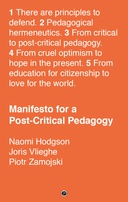Explore

Manifesto for a Post-Critical Pedagogy
0 Ungluers have
Faved this Work
Login to Fave
The belief in the transformative potential of education has long underpinned critical educational theory. But its concerns have also been largely political and economic, using education as the means to achieve a better – or ideal – future state: of equality and social justice. Our concern is not whether such a state can be realized. Rather, the belief in the transformative potential of education leads us to start from the assumption of equality and to attend to what is “educational” about education.In Manifesto for a Post-Critical Pedagogy we set out five principles that call not for an education as a means to achieve a future state, but rather that make manifest those educational practices that do exist today and that we wish to defend. The Manifesto also acts as a provocation, as the starting point of a conversation about what this means for research, pedagogy, and our relation to our children, each other, and the world.Manifesto for a Post-Critical Pedagogy invites a shift from a critical pedagogy premised on revealing what is wrong with the world and using education to solve it, to an affirmative stance that acknowledges what is educational in our existing practices. It is focused on what we do and what we can do, if we approach education with love for the world and acknowledge that education is based on hope in the present, rather than on optimism for an eternally deferred future.ABOUT THE AUTHORNaomi Hodgson is Lecturer in Education Studies at Liverpool Hope University (UK) where she teaches and researches in philosophy of education. Her research focuses on the relationship between education, governance, and subjectivity. Her publications include Philosophy and Theory in Education: Writing in the Margin, with Dr Amanda Fulford (Routledge, 2016), Citizenship for the Learning Society: Europe, Subjectivity, and Educational Research (Wiley, 2016), and the forthcoming Philosophical Presentations of Raising Children: the grammar of upbringing, with Dr Stefan Ramaekers (Palgrave, 2018).Joris Vlieghe is Lecturer in philosophy of education at Aberdeen University (UK). His current research deals with the impact of digitization on the meaning of education and on the transformations this implies for school practices. He is also interested in developing a post-critical approach to teaching in terms of a passionate love for a subject matter.Piotr Zamojski is a Lecturer in philosophy of education at Liverpool Hope University (UK), and adjunct lecturer in educational theory at the University of Gdańsk. His research interests include the relation between totalitarianism and educational theory, the Holocaust and education, the making of solidarity, post-critical pedagogy, and post-critical philosophy for education.
This book is included in DOAB.
Why read this book? Have your say.
You must be logged in to comment.
